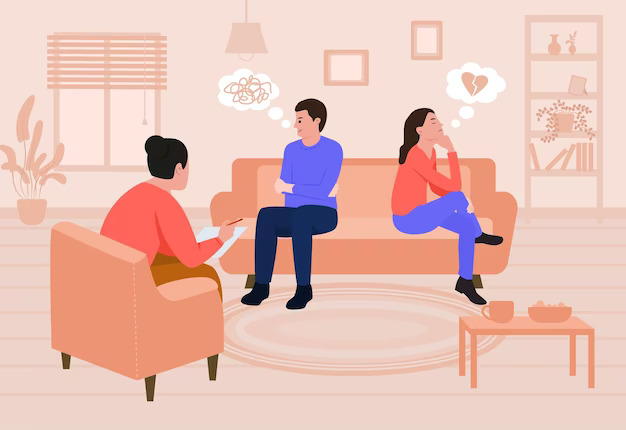
Relationship conflict refers to disagreements, disputes, or tensions that occur between individuals in a personal or interpersonal relationship. These conflicts can arise in various types of relationships, including romantic partnerships, family relationships, friendships, and professional connections.
What is relationship conflict in organization?
Relationship conflict in an organizational context refers to disagreements, tensions, or disputes that arise among individuals or groups within the workplace. Unlike task-related conflicts that may revolve around work processes or goals, relationship conflicts primarily concern personal interactions, emotions, and interpersonal dynamics among colleagues, managers, or team members.
How to Cope with Relationship conflict
Relationship conflicts can strain bonds, but with the help of “Relationship counsellors”, healing and growth are possible. Here are steps to cope with relationship conflict effectively:
- Stay Calm: Try to remain calm and composed during the conflict. Take deep breaths to manage your emotions and prevent impulsivity.
- Active listening:– means paying attentive attention to what the other person is saying. Make it clear that you are really interested in learning about their viewpoint.
- Use “I” Statements: Express your feelings and concerns using “I” statements to avoid blame or accusations. For example, say, “I feel frustrated when…” instead of “You always…”
- Avoid Blame: Focus on the specific issue at hand rather than attacking the person. Blame can escalate conflict.
- Take a Break: If emotions are running high and productive communication seems impossible, consider taking a break to cool off. Agree on a time to revisit the discussion when both parties are calmer.
- Try to empathize:- with the other person and try to understand the problem from their point of view. Empathizing can help you understand their feelings and needs.
- Find Common Ground: Seek out places of understanding or compromise. Finding common ground can be a starting point for resolving the conflict.
- Use “We” Language: Shift from an “I vs. To emphasize that you’re cooperating to find a solution, go from a “You” perspective to a “We” mindset.
- Focus on Solutions: Instead of dwelling on the problem, collaborate to find solutions. Brainstorm and consider multiple options.
- Set Boundaries: Establish clear boundaries and expectations in your relationship or work environment. This can help prevent conflicts related to unmet expectations.
Remember that conflict is a natural part of any relationship or workplace. Managing relationship conflicts becomes easier with “online counseling”, offering guidance on handling their impact on relationships.
The Impact of Relationship Conflict on Relationships
Relationship conflict can have a significant impact on relationships, and the consequences can vary depending on how conflicts are managed and resolved. Here are some of the ways in which relationship conflict can affect relationships:
- Communication Breakdown: Ongoing conflict can lead to breakdowns in communication. When conflict is not addressed effectively, partners may stop communicating openly and honestly with each other, leading to misunderstandings and increased tension.
- Emotional Distress: Conflict often triggers strong emotions such as anger, frustration, sadness, and anxiety. Prolonged exposure to these negative emotions can lead to emotional distress for both individuals, which can, in turn, affect their overall well-being.
- Erosion of Trust: Unresolved conflicts can erode trust between partners. When promises are broken or conflicts escalate into hurtful arguments, trust can be damaged, making it difficult for the relationship to thrive.
- Physical and Mental Health Impact: The stress associated with ongoing conflict can have physical and mental health consequences. It can lead to sleep disturbances, increased cortisol levels (a stress hormone), and exacerbation of pre-existing health conditions.
- Distance and Alienation: Conflicts can create emotional distance between partners. As individuals withdraw to protect themselves from the pain of conflict, they may become emotionally distant from each other, leading to a sense of alienation.
- Reduced Relationship Satisfaction: Persistent conflict can decrease overall relationship satisfaction. When conflicts are not resolved in a way that meets the needs and concerns of both partners, satisfaction with the relationship can decline.
- Impact on Children and Family: If conflicts occur within a family or parental relationship, they can also affect children and other family members. Witnessing constant conflict can be distressing for children and may have long-term emotional consequences.
- Relationship Dissolution: In some cases, unresolved conflict can lead to the dissolution of the relationship. When conflicts become too frequent or too severe, individuals may decide that the relationship is no longer healthy or viable.
- Stagnation and Lack of Growth: Constant conflict can hinder personal and relationship growth. It can prevent partners from working together to overcome challenges and achieve common goals.
- Financial and Practical Concerns: Some conflicts, such as those related to finances or household responsibilities, can have practical implications. Unresolved issues in these areas can lead to financial stress or increased burdens on one partner.
conclusion
It’s important to note that not all conflict is detrimental to relationships. Healthy conflict, when managed constructively, can lead to increased understanding, personal growth, and stronger connections between partners.


